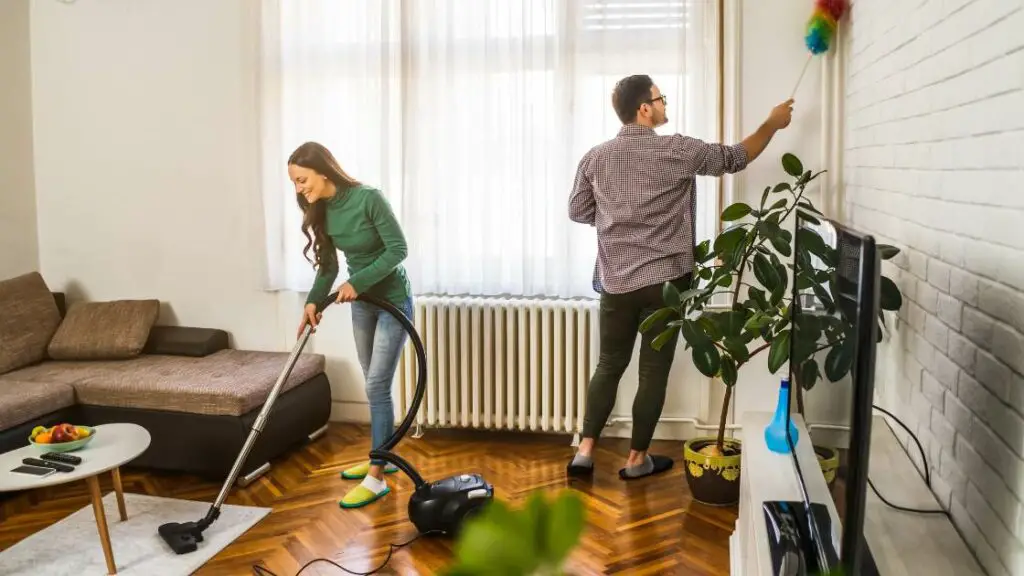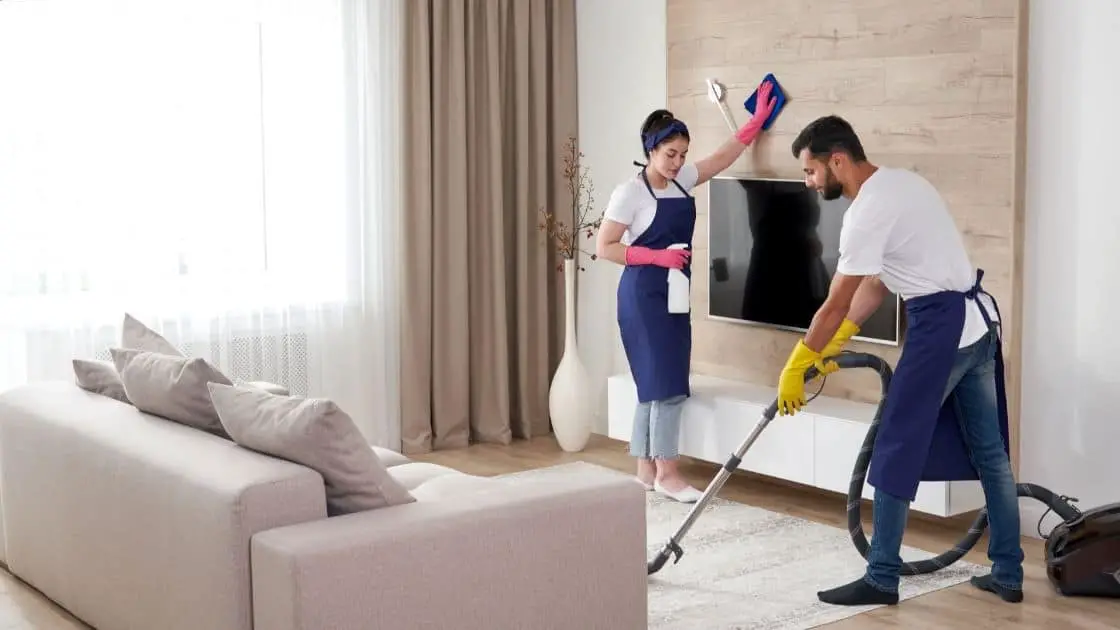No one wants to walk into their new home, and it is a mess. When you enter your new home, you expect it to be as clean as it can possibly be.
But sometimes that is not the case. If you are wondering who has the responsibility to make sure your new home is clean before you move in, you are in the right place.
In this article, we will be discussing whether landlords have to clean between their tenants and what you can do if your new home is not clean upon move in.
Let’s get into it!
The information contained in this post is for informational purposes only. It is not legal advice. You should seek the advice of a qualified legal professional before making any decisions relating to the topics covered by this article.
We may earn commissions from products and services that are purchased or recommended through our website as part of our affiliate partnerships. As an Amazon affiliate, we may earn from qualifying purchases.
Who Is Responsible For Cleaning Between Tenants?

As a general matter, landlords are responsible for cleaning the unit prior to a new tenant moving into the premises. The unit should be reasonably clean, safe and habitable upon move-in. But if the prior tenant did not leave the premises in about the same condition they received it, the landlord may charge that tenant for the costs of cleaning.
The lease will typically govern the respective rights and obligations between a tenant and landlord.
In most cases, the lease will require the tenant to clean the dwelling and generally leave the property in the condition in which they received it to begin with.
This usually means delivering the property at least “broom clean” condition, without a bunch of trash, stains and mess cluttering the unit.
If the tenants fail to do this, the landlord usually has some recourse against the tenant, which could include deducting the cost of cleaning from the tenant’s security deposit.
In many cases, landlords will have professional cleaners on call to handle “turns” which are basically transitions between tenants. They will come in and clean the property thoroughly in preparation for a new tenant.
They also need to make sure that all the appliances and fixtures are in good working order as well.
The bottom line is that, unless the landlord and new tenant have agreed otherwise, it isn’t up to the new tenants to deal with the condition that the old tenants have left the property in.
If the previous tenants have left the property in a poor condition, then the landlord has to take responsibility (which again, the landlord will usually remediate by getting the work done with money from the security deposit).
Landlord Responsibilities For Cleanliness
Landlords have the following responsibilities during the in-between stages of tenants, which includes looking after and cleaning the property.
They are responsible for cleaning common areas and making sure that there is plenty of light in these areas.
The landlord has to make sure that the property has all the necessary and proper locks that keep the property safe.
If the new tenants want to change the locks, then they have to get permission from the landlord, and also provide them with a new key.
In addition to that, a landlord is responsible for all the maintenance needs that occur between tenants.
Generally, a landlord should conduct a move-out inspection of the property each time a tenant is leaving to identify any issues with the property and resolve them with the tenant.
In general, there is a warranty of habitability that landlords must meet when delivering the premises, which basically means that unit must be fit for human living. If the unit is filthy, infested with pests, has rampant mold or other unsafe conditions, that is something that the landlord must remediate prior to move-in.
Tenants Responsibilities For Cleanliness

Landlords may have a lot of cleanliness responsibilities, but so do tenants.
Tenants are usually required to maintain basic cleanliness standards while living in their dwelling. Leases will often require tenants to maintain the premises in a clean and sanitary condition, including properly disposing of trash, maintaining the unit in a way that prevents accumulation of moisture and growth of mold, and maintain floors, carpets (and the premises in general) in clean condition.
It’s a good idea to do this anyway because you don’t want to live in filth and you will have a lot less work to do, when you move out.
As a general matter, once your lease starts, the cleanliness of the property becomes your responsibility.
If your lack of cleanliness causes damage to the property, your landlord may charge you for fixing those damages, so it’s a good idea to keep your dwelling clean and in good condition.
What Can You Do If Your New Home is Not Clean Upon Move In?
As a general matter, you should notify your landlord if your new home is not clean when you move in. If there is garbage lying around, uncleaned stains and the place is a general mess, you should absolutely let your landlord know. In most cases, they should be reasonable and arrange for cleaning.
If they refuse to clean the place, you should look at your lease to see if there are provisions that govern what the condition of the property should be upon move-in.
Even if the lease is silent on the matter, there is an implied warranty of habitability that basically requires that your property be delivered in a safe and livable condition by the landlord.
Now this won’t typically cover a little dirt or some stains, but if there is meaningful unremediated mold, for example, or really unsafe sanitary conditions, like a major pest infestation, then that is a serious problem that your landlord should address, even if the lease doesn’t expressly talk about it.
Conclusion
In short, it is down to the landlord to inspect the property between tenants.
Then, if any work needed to be done, the landlord can fulfill it before the new tenants move in, but the previous tenants could be charged or deductions will be taken from the previous tenants’ security deposits.
As a result, the previous tenants should do their best to clean and complete any repairs that need to be done before they leave the property.
Then the landlord can complete any last minute repairs or cleaning that need to be done.
New tenants shouldn’t be walking into a dirty or broken property, the landlord should have made sure it was fit for them to move into.
We hope now you understand the responsibilities that a landlord has between tenants, and that they should clean if necessary.


